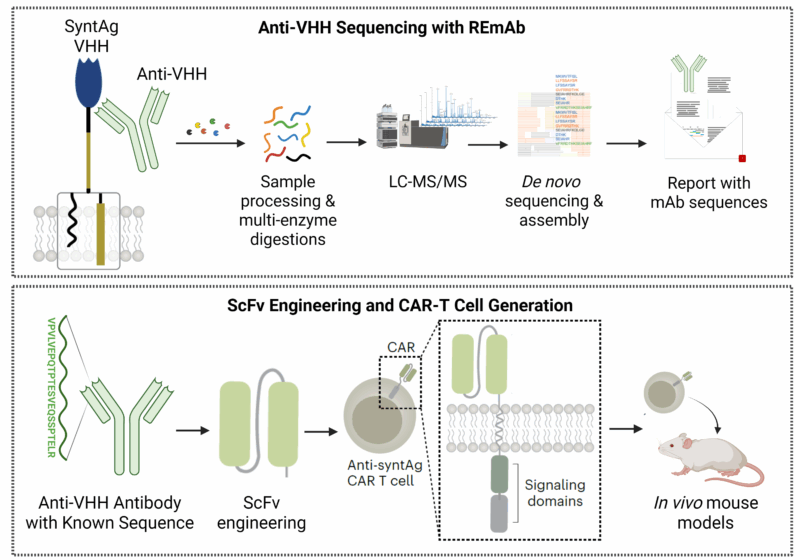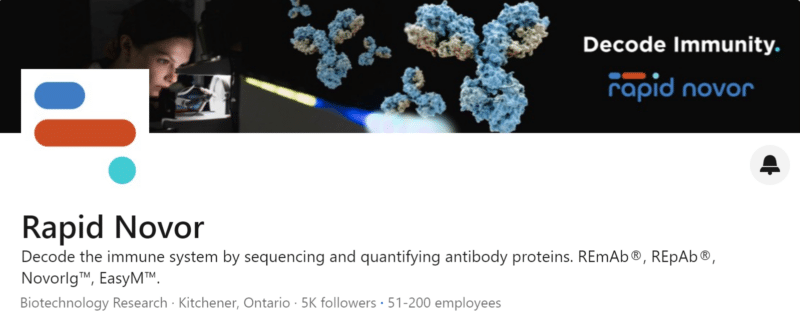Gamboa, L., Zamat, A.H., Thiveaud, C.A. et al. Sensitizing solid tumors to CAR-mediated cytotoxicity by lipid nanoparticle delivery of synthetic antigens. Nat Cancer 6, 1073–1087 (2025). https://doi.org/10.1038/s43018-025-00968-5

To target a novel synthetic antigen expressed by tumor cells, an anti-VHH monoclonal antibody was de novo sequenced using LC-MS/MS. The sequence was then used to design scFvs for incorporation into CAR constructs and evaluation in in vivo mouse models.
Key Takeaways
- To overcome the lack of reliable targets in solid tumors, researchers introduced synthetic antigens that can be selectively expressed in tumors, enabling precise CAR-T cell recognition.
- A VHH-based synthetic antigen was used, and Rapid Novor’s de novo antibody sequencing service provided the sequence of an anti-VHH antibody, enabling the engineering of a CAR construct that targets the novel VHH-based antigen.
- In preclinical studies, this approach led to effective tumor control and reduced antigen escape, demonstrating the promise of combining synthetic antigens with customized CAR-T development.
Summary
Chimeric antigen receptor (CAR) T cell therapy has shown limited success in solid tumors. Challenges include heterogeneous or low expression of tumor-associated antigens (TAAs), antigen loss leading to immune escape, and on-target off-tumor toxicities due to antigen expression on healthy tissues.
To overcome the challenge of finding reliable tumor-specific antigens, researchers at the Georgia Institute of Technology developed synthetic antigens (SynAgs)—engineered, non-native antigens that sensitize solid tumors for CAR T cell recognition and elimination.
By delivering mRNA-loaded lipid nanoparticles (LNPs), tumor cells are programmed to express a custom VHH-based SynAg on their surface, enabling precise targeting and cytotoxicity by anti-VHH CAR T cells.
The team used a VHH antigen-binding fragment as a syntAg and needed to develop a CAR-T cell capable of targeting it. To achieve this, they employed Rapid Novor’s REmAb® de novo antibody sequencing service to determine the sequence of a rabbit anti-VHH antibody. This sequence was then engineered into a single-chain variable fragment (scFv) and incorporated into a CAR construct.
In animal models, treatment with anti-VHH CAR T cells led to significant tumor reduction, prolonged survival, prevented tumor recurrence, and lowered the risk of antigen escape in tumors with diverse cell populations.
These results highlight the potential of delivering synthetic antigens directly into tumors as a strategy to broaden the applicability of CAR-T cell therapies to cancers lacking reliable targets. To effectively utilize synthetic antigens, novel CAR-Ts must be developed to recognize these engineered targets, a process accelerated by de novo antibody sequencing and protein engineering.
Talk to Our Scientists.
We Have Sequenced 10,000+ Antibodies and We Are Eager to Help You.
Through next generation protein sequencing, Rapid Novor enables reliable discovery and development of novel reagents, diagnostics, and therapeutics. Thanks to our Next Generation Protein Sequencing and antibody discovery services, researchers have furthered thousands of projects, patented antibody therapeutics, and developed the first recombinant polyclonal antibody diagnostics.
Talk to Our Scientists.
We Have Sequenced 9000+ Antibodies and We Are Eager to Help You.
Through next generation protein sequencing, Rapid Novor enables timely and reliable discovery and development of novel reagents, diagnostics, and therapeutics. Thanks to our Next Generation Protein Sequencing and antibody discovery services, researchers have furthered thousands of projects, patented antibody therapeutics, and ran the first recombinant polyclonal antibody diagnostics

